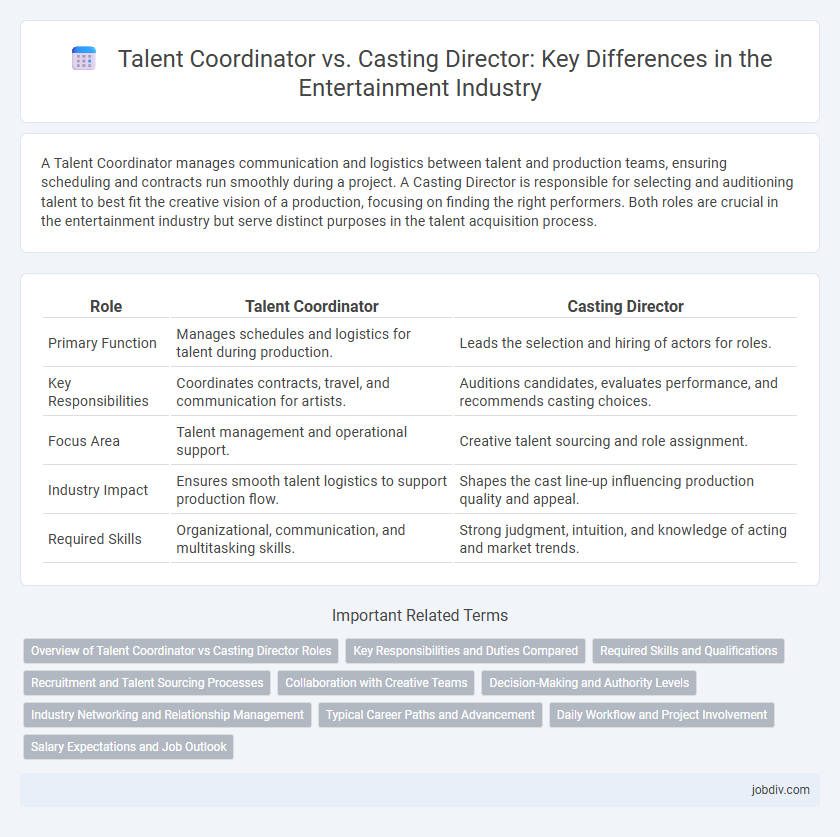A Talent Coordinator manages communication and logistics between talent and production teams, ensuring scheduling and contracts run smoothly during a project. A Casting Director is responsible for selecting and auditioning talent to best fit the creative vision of a production, focusing on finding the right performers. Both roles are crucial in the entertainment industry but serve distinct purposes in the talent acquisition process.
Table of Comparison
| Role | Talent Coordinator | Casting Director |
|---|---|---|
| Primary Function | Manages schedules and logistics for talent during production. | Leads the selection and hiring of actors for roles. |
| Key Responsibilities | Coordinates contracts, travel, and communication for artists. | Auditions candidates, evaluates performance, and recommends casting choices. |
| Focus Area | Talent management and operational support. | Creative talent sourcing and role assignment. |
| Industry Impact | Ensures smooth talent logistics to support production flow. | Shapes the cast line-up influencing production quality and appeal. |
| Required Skills | Organizational, communication, and multitasking skills. | Strong judgment, intuition, and knowledge of acting and market trends. |
Overview of Talent Coordinator vs Casting Director Roles
Talent coordinators manage the logistics of booking, scheduling, and coordinating talent for productions, ensuring smooth communication between artists and production teams. Casting directors specialize in identifying, auditioning, and selecting actors or performers best suited for specific roles in film, television, or theater projects. Both roles are critical in the entertainment industry, with talent coordinators focusing on operational support and casting directors on creative talent acquisition.
Key Responsibilities and Duties Compared
Talent Coordinators primarily manage logistical aspects such as scheduling auditions, organizing talent availability, and maintaining communication between actors and production teams. Casting Directors focus on evaluating potential candidates, conducting auditions, and selecting suitable actors to fulfill specific roles within a project. Both roles collaborate closely to ensure efficient casting processes and optimal talent placement in entertainment productions.
Required Skills and Qualifications
Talent Coordinators require strong organizational skills, effective communication abilities, and proficiency in scheduling and logistics management to coordinate talent appointments and auditions efficiently. Casting Directors must possess keen evaluative judgment, extensive knowledge of acting techniques, and industry connections to select suitable actors for roles, often supported by a background in theater or film production. Both roles benefit from experience in talent management software and an understanding of contractual and negotiation processes within the entertainment industry.
Recruitment and Talent Sourcing Processes
Talent Coordinators manage the logistics of recruitment by organizing auditions, scheduling interviews, and maintaining communication between actors and production teams, ensuring efficient talent sourcing. Casting Directors focus on identifying and selecting appropriate talent to fit specific roles, conducting in-depth evaluations, and collaborating with directors to align casting choices with creative vision. Both roles streamline the talent acquisition process but differ in responsibility scope, with Talent Coordinators handling administrative tasks and Casting Directors directing artistic decisions.
Collaboration with Creative Teams
Talent Coordinators and Casting Directors collaborate closely with creative teams to align talent selection with the project's artistic vision and production needs. Talent Coordinators manage communication and logistics between actors and the creative team, ensuring seamless scheduling and contract compliance. Casting Directors contribute their expertise by identifying and auditioning performers who best embody the creative team's character requirements and storytelling goals.
Decision-Making and Authority Levels
Talent Coordinators manage logistics and communication to support casting decisions, ensuring schedules and availability align with production needs, while Casting Directors hold final authority in selecting actors based on creative vision and project requirements. Casting Directors evaluate artistic suitability and negotiate contracts, guiding the overall casting process with decision-making power that directly impacts the creative outcome. Talent Coordinators execute directives and facilitate coordination, operating under the Casting Director's strategic leadership and authority throughout the talent acquisition phase.
Industry Networking and Relationship Management
Talent coordinators excel in managing daily communication and scheduling between agents, actors, and production teams, ensuring seamless coordination on set. Casting directors leverage extensive industry networks and deep relationships with agents, managers, and talent to identify and secure the best performers for roles. Effective relationship management by casting directors shapes casting decisions, while talent coordinators sustain logistical connections that keep projects running smoothly.
Typical Career Paths and Advancement
Talent coordinators often start in entry-level production roles, gaining experience in scheduling and communication before advancing to senior coordinator or talent manager positions. Casting directors typically progress from casting assistants or associates, honing skills in talent evaluation and industry networking, and may elevate to lead director roles or talent agency partnerships. Both career paths benefit from strong industry relationships and a deep understanding of casting processes to achieve long-term advancement.
Daily Workflow and Project Involvement
Talent Coordinators manage scheduling, communication, and logistics for actors and crew members, ensuring smooth daily operations on set or during auditions. Casting Directors focus on selecting suitable actors by organizing auditions, reviewing portfolios, and collaborating closely with directors and producers to fulfill project casting needs. While Talent Coordinators handle ongoing talent management tasks, Casting Directors are deeply involved in the preliminary stages of project development, shaping the cast to align with creative vision.
Salary Expectations and Job Outlook
Talent Coordinators typically earn between $45,000 and $65,000 annually, managing scheduling and logistics to support casting processes, while Casting Directors command higher salaries ranging from $70,000 to over $120,000 due to their strategic role in selecting actors for productions. The job outlook for Casting Directors is robust, driven by expanding film, television, and digital media industries, whereas Talent Coordinators experience steady demand primarily in large-scale productions and agencies. Both roles offer growth potential, with Casting Directors often advancing to producer positions, reflecting their significant influence on project success.
Talent Coordinator vs Casting Director Infographic

 jobdiv.com
jobdiv.com